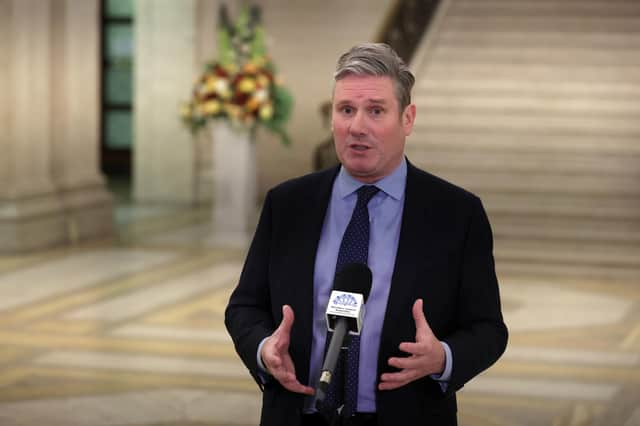Labour still needs to define what it stands for or risk defeat at the next General Election - Matthew Flinders


New Year polls suggest grounds for optimism - most polls place Labour on around 45 per cent when it comes to public voting intentions, with the Conservatives on just 19 per cent and the Lib Dems on 8 per cent. But the Labour Party is a strange political beast. It stands alone in its capacity for snatching defeat out of the jaws of victory, and is unique in demonising the only leader who led it to three consecutive victories.
After over a decade of Conservative government, a succession of crises, the blunders of Boris, 2023 really is breakthrough or bust for the Labour Party.
Advertisement
Hide AdAdvertisement
Hide AdIf a freshly anointed Rishi Sunak walks back through the doors of Number 10 in 2024, it would be hard to see a future for the Labour Party in anything like its current form.
Forget the opinion polls. They mean very little. One of the few things that are certain in British politics today is that voters are more fickle and fluid than they have ever been.
In order to translate voting intentions into action at the ballot box the Labour Party needs to deal with an increasingly obvious dilemma: it needs to explain what the party actually stands for.
As a general election approaches the official opposition has to evolve and change for the simple reason that opposing is not enough. At some point the public will demand detailed policy positions, costed plans and evidence that a credible government-in-waiting really does exist.
Advertisement
Hide AdAdvertisement
Hide AdBut in order to do this the party itself needs to possess a sense of self-belief and collective confidence born from a clear understanding of what exactly the Labour Party now stands for. What, in a nutshell, is the Labour Party’s offer to the British public? I’m not convinced that it has an answer to this question.
It is the answer to this question that should provide the foundations for everything the party seeks to do and how it intends to govern.
Whether you like it or not it is the ‘vision thing’ that really matters in politics. People vote for a different future, for new opportunities, for fresh starts. It’s the vision-thing that will be needed to turn the Labour Party’s current lead in the polls into a parliamentary majority.
Questions have been asked about Keir Starmer’s communication skills since he became leader of the party. He does not light up a room simply by walking into it. He is not charismatic. But blaming the leader is far too easy.
Advertisement
Hide AdAdvertisement
Hide AdTo some extent, Rishi Sunak and Keir Starmer share a certain nerdy technocratic bent but whereas the public broadly know what the Tories ‘are about’ they seem less sure and more uncertain in relation to Labour.
More worryingly for the Labour Party, as I wander through the streets of Kiveton Park, Dinnington and Bolsover the people that I meet in these traditional Labour strongholds seem united in a belief that if Labour is ‘about’ anything then it is not interested in them. Local people too often feel like strangers in their own land; disparaged, demeaned and ditched by a party that is widely perceived as being out of touch with their traditional communities. What Labour appears to lack is a clear and inclusive answer to the ‘what do you stand for’ question.
Kevin Sinfield is not a politician. He is a former rugby player. In recent years he has raised over £7m by undertaking a series of gruelling physical challenges to fund Motor Neurone Disease charities and research, after his former Leeds Rhinos team-mate and great friend Rob Burrow was diagnosed with the condition in 2019.
Like the Labour Party, the England rugby union team is also facing a breakthrough or bust year.
Advertisement
Hide AdAdvertisement
Hide AdAfter a very poor performance in 2022 (five wins, one draw, seven defeats) and with the Rugby World Cup just nine months away in 2023 the team manager, Eddie Jones, was sacked and Sinfield was appointed as part of a new coaching team. And in a typically under-stated manner he declared that his approach to helping turn around the team’s fortunes would be based on an emphasis on ‘friendship and memories’ and not just ‘money and medals’. In one simple sentence a whole sporting ideology is laid bare.
If the Labour Party is going to flourish and thrive in 2023 then it urgently needs to find a similarly simple and inspiring core essence.
Politics is, of course, a far messier business than rugby, and sporting allusions are for this reason easy to dismiss.
But what the Labour Party cannot deny or dismiss is the fact that at the moment they are not cutting through to the public with a clear and sharp message about who they are and what they stand for.
Matthew Flinders is Professor of Politics at the University of Sheffield and Vice President of the Political Studies Association of the United Kingdom.